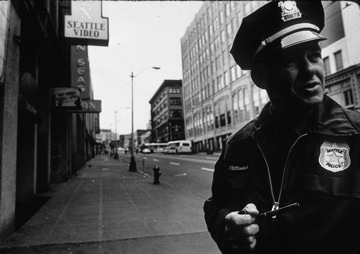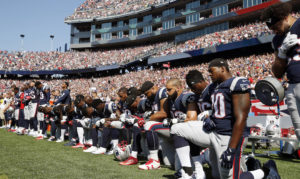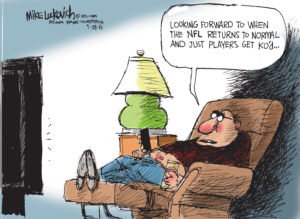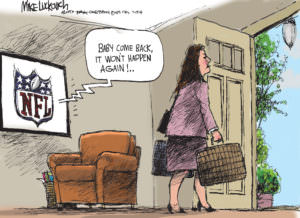Domestic Violence Kills More People Than War and It’s Not Just the NFL at Fault; It’s Police Too
If we focus only on the abusive acts of athletes such as Ray Rice and Adrian Peterson, we may miss the fact that in the U.S. the families at highest risk of domestic violence are actually relatives of law enforcement officials. Studies have found that the children and partners of police officers are two to four times more likely to be victims of domestic abuse than are those in the general population. Seattle Municipal Archives (CC BY 2.0)
Studies have found that the children and partners of police officers are two to four times more likely to be victims of domestic abuse than are those in the general population. Seattle Municipal Archives (CC BY 2.0)
A recent global study found that, compared with civil warfare, domestic violence takes more lives and represents an economic loss of about $9.5 trillion a year, meaning it’s “more costly than war.” And yet if we focus only on the acts of athletes such as Ray Rice and Adrian Peterson, we may miss the fact that in the U.S. the families at highest risk of abuse are actually relatives of law enforcement officials.
The Atlantic:
If there’s any job that domestic abuse should disqualify a person from holding, isn’t it the one job that gives you a lethal weapon, trains you to stalk people without their noticing, and relies on your judgment and discretion to protect the abused against domestic abusers?
The opprobrium heaped on the NFL for failing to suspend or terminate domestic abusers, and the virtual absence of similar pressure directed at police departments, leads me to believe that many people don’t know the extent of domestic abuse among officers. This is somewhat surprising, since a country shocked by Ray Rice’s actions ought to be even more horrified by the most egregious examples of domestic abuse among police officers. Their stories end in death.
There’s the recently retired 30-year veteran police officer who shot his wife and then himself in Colorado Springs earlier this summer. There’s Tacoma Police Chief David Brame, who perpetrated another murder-suicide in April. (Update: it’s in fact the tenth anniversary of this crime, which I missed in the ABC story.) Also in April, an Indiana news station reported on “Sgt. Ryan Anders, a narcotics officer,” who “broke into his ex-wife’s home and fatally shot her. He then turned the gun on himself.” In February, “Dallas police confirmed … that a Crandall police officer shot and killed his wife before killing himself.” Last year, a Nevada police officer killed his wife, his son, and then himself. And Joshua Boren, a Utah police officer, “killed his wife, their two children, his mother-in-law and then himself” after receiving “text messages … hours earlier threatening to leave him and take their kids and confronting him for raping her.” That isn’t an exhaustive survey, just a quick roundup of recent stories gleaned from the first couple pages of Google results. And statistics about “blue” domestic abuse are shocking in their own way.
As the National Center for Women and Policing noted in a heavily footnoted information sheet, “Two studies have found that at least 40 percent of police officer families experience domestic violence, in contrast to 10 percent of families in the general population. A third study of older and more experienced officers found a rate of 24 percent, indicating that domestic violence is two to four times more common among police families than American families in general.” Cops “typically handle cases of police family violence informally, often without an official report, investigation, or even check of the victim’s safety,” the summary continues. “This ‘informal’ method is often in direct contradiction to legislative mandates and departmental policies regarding the appropriate response to domestic violence crimes.” Finally, “even officers who are found guilty of domestic violence are unlikely to be fired, arrested, or referred for prosecution.”
All these statistics, in addition to the police brutality we’ve recently witnessed in Ferguson, among other places, has to make us wonder, as the Roman poet Juvenal once did, “Quis custodiet ipsos custodes?” Who watches the watchman, who will guard the guards themselves?
—Posted by Natasha Hakimi Zapata
Your support matters…Independent journalism is under threat and overshadowed by heavily funded mainstream media.
You can help level the playing field. Become a member.
Your tax-deductible contribution keeps us digging beneath the headlines to give you thought-provoking, investigative reporting and analysis that unearths what's really happening- without compromise.
Give today to support our courageous, independent journalists.









You need to be a supporter to comment.
There are currently no responses to this article.
Be the first to respond.